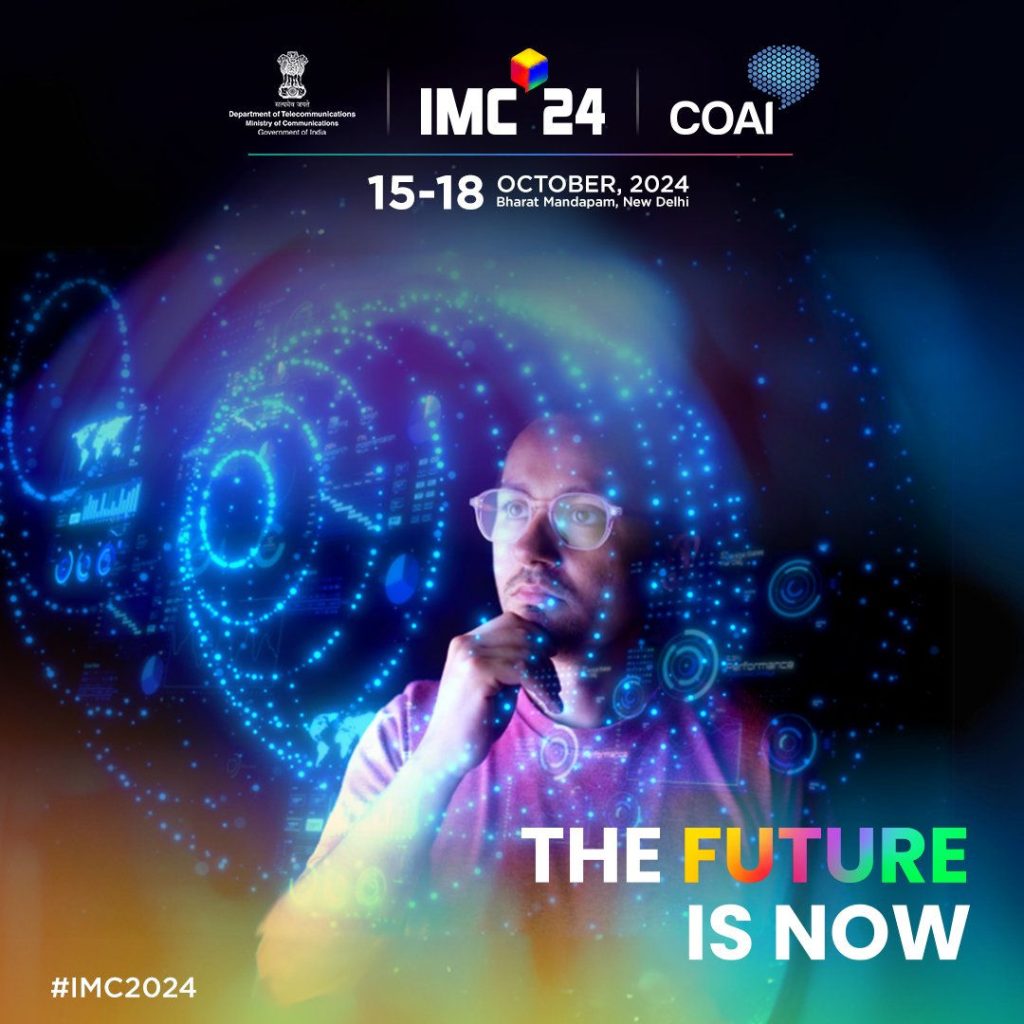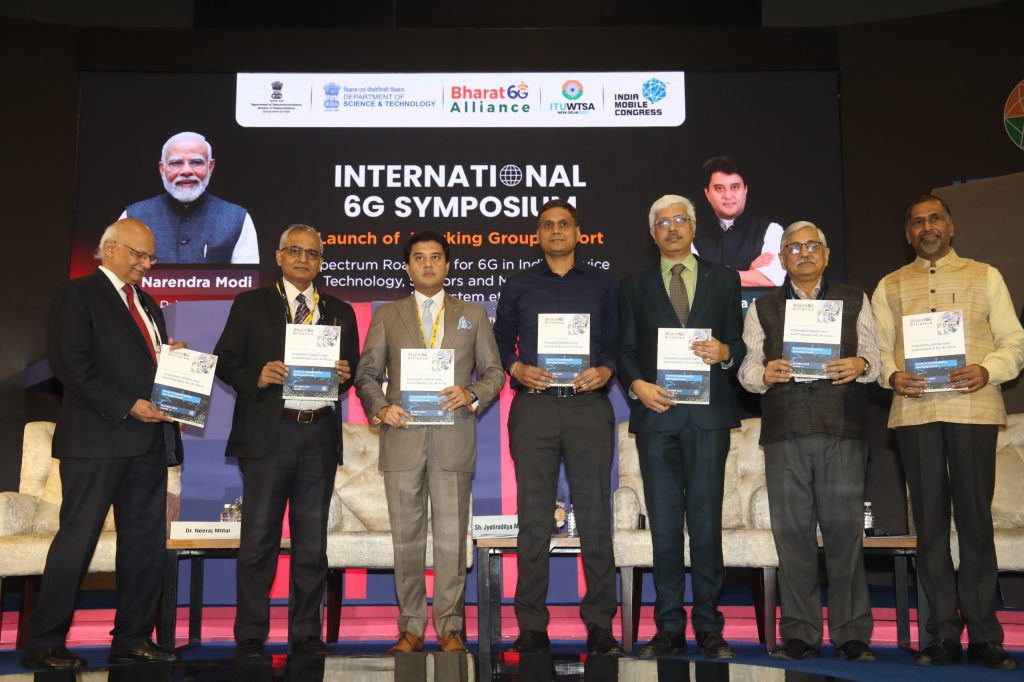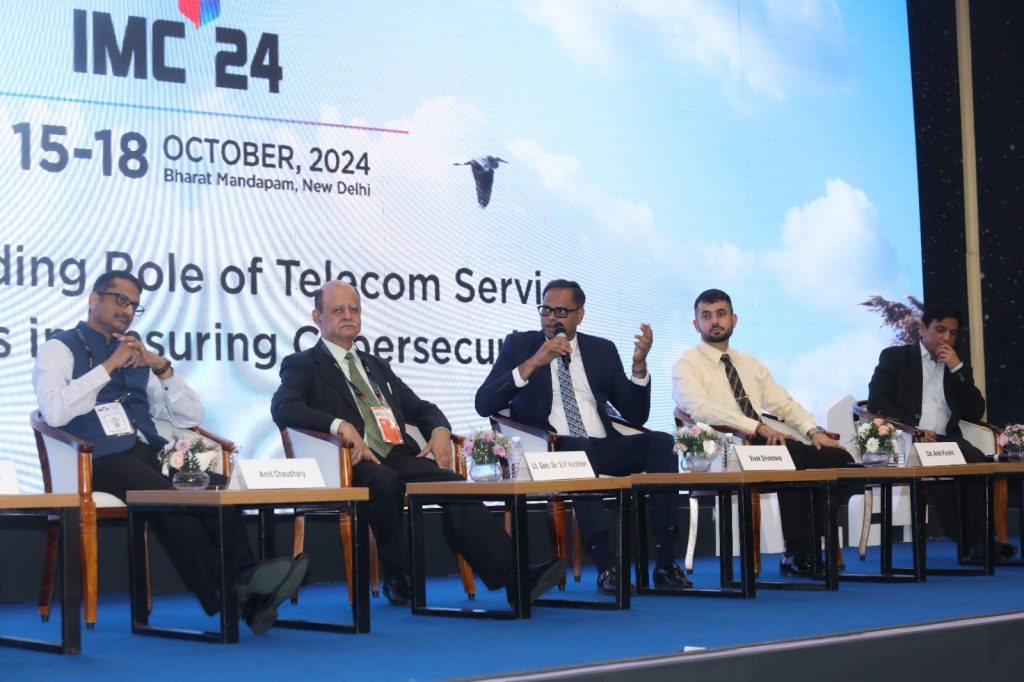
India Mobile Congress (IMC), Asia’s premier digital technology exhibition, kicked off yesterday with the inauguration by Prime Minister Narendra Modi at Bharat Mandapam. The big event, co-hosted by the Department of Telecommunications (DoT) and the Cellular Operators Association of India (COAI), revolves around the theme ‘The Future is Now.’
The event will run until 18th October 2024 at Pragati Maidan in New Delhi. The second day of IMC 2024 also witnessed senior industry leaders deliberating on relevant themes, including Future Digital Infrastructure for Viksit BHARAT, AI driving Autonomous networks of the future, and the Expanding Role of Telecom Service Providers in Ensuring Cybersecurity.
India Mobile Congress (IMC) 2024 Day 2 Highlights:
Day 2 of the event began with a breakfast meeting of Shri Jyotiraditya M. Scindia, Hon’ble Minister of Communications and Development of Northeastern Region, with prominent CEOs from leading global companies on the theme ‘Leading in the Moment: The Future is Now’.

There was also the inauguration of the International 6G Symposium, the Launch of the Telecom Smart Cities Index by OpenSignal, and a Workshop with Academicians of 5G Test Labs.
At the event, Opensignal, an independent analytics company specializing in consumer connectivity experiences, released the Telecom Smart Cities Index. The company assessed the mobile infrastructure of 50 Indian cities, highlighting their readiness for smart city transformation based on 4G/5G availability, consistent quality, and overall download speeds.
According to Opensignal’s Indian Cities Digital Readiness Ranking (ICDRR) assessment, the top 5 ranked cities in India are Srinagar, Agra, Faridabad, Jaipur, and Patna.

The event also featured a workshop that included academicians from 5G test labs, focusing on enhancing the indigenous 5G network for 5G+/6G standards. The discussions covered the role of enterprise private networks, network transformation with 5G/5G+, applications for enterprise verticals, industrial 5G use cases, and live demos conducted by 5G ACIA in their test beds.

The day also featured important sessions and panel discussions, which included:
- Supercharging India through Equitable AI
- Future unveiled: Key insights for the new techade
- Securing the Digital realm: Enhancing cyber defense
- Techos pioneering the future of private networks
- AI driving Autonomous networks of the future (Part A)
- AI-enhanced processing: The future of Chipsets
- Navigating Gen AI: Advances challenges and opportunities
- Future Digital Infrastructure for Viksit BHARAT
- The Expanding Role of Telecom Service Providers in Ensuring Cybersecurity
- Satellite Communication: The Pulse of a Digital Nation
- Decarbonizing for a Sustainable Digital Future.
Some Day 1 event were also continued on Day 2 that focused on emerging technologies and the role of AI across various industries, including telecom, satcom, semiconductors, cybersecurity, education, cloud & edge computing, and electronics manufacturing, highlighting their impact on society and the global economy.
At the event, Dr. Neeraj Mittal, Secretary, DoT said,
India is becoming a focal point for global innovation in technologies. The IMC and the ITU-WTSA is playing crucial roles in showcasing products, setting standards, and driving collaboration. As a leader in the 6G Alliance, India aims to collaborate with partners to advance research, standardization, and public-private partnerships. Joint research efforts, policy harmonization, and the development of skilled manpower are key priorities. Through these initiatives, India seeks to position itself as a global leader in 6G technology and drive innovation and development.
Shri D Sridhar Babu, IT Minister, Telangana said,
Telangana stands as a beacon of innovation, boasting impressive statistics that highlight our state’s technological and academic prowess. We have 1.5 lakh engineers, 1 lakh STEM graduates, and a total of 2.5 lakh graduates fuelling our dynamic workforce. Telangana is uniquely positioned to harness this growth. Our approach to becoming an AI powerhouse is not only visionary but meticulously executed. We are developing an AI-ready ecosystem characterized by state-of-the-art compute capacity, unified AI services, and substantial funding for AI startups. At the core of this vision is the Telangana AI Mission, built upon seven foundational pillars designed to drive our AI strategy forward. These pillars include the Young India Skill Development University, AI Capacity, Trust in AI, AI City, CoEs for key industries, AI for Grassroots, and AI in Governance.
Lt. Gen. Dr. S.P. Kochhar, DG, COAI said,
As technology advances at an unprecedented pace, policies and regulations must adapt rapidly to keep up. The growing complexity of network boundaries, data sovereignty, and the integration of man-machine interfaces in 5G and beyond call for a seamless blend of public-private partnerships. By leveraging the private sector’s expertise and integrating cutting-edge technologies like AI and blockchain, we can build policies that are dynamic, interactive, and future-ready. Technologies like quantum computing and blockchain will play a key role in enforcing these policies, but they also bring challenges such as data sovereignty and Global Personal Taxation Regimes (GPTR), which are not inherently supported by technology. These concepts are alien to the digital infrastructure, yet legislation continues to enforce policies that don’t align with the technical capabilities of the systems in place.
